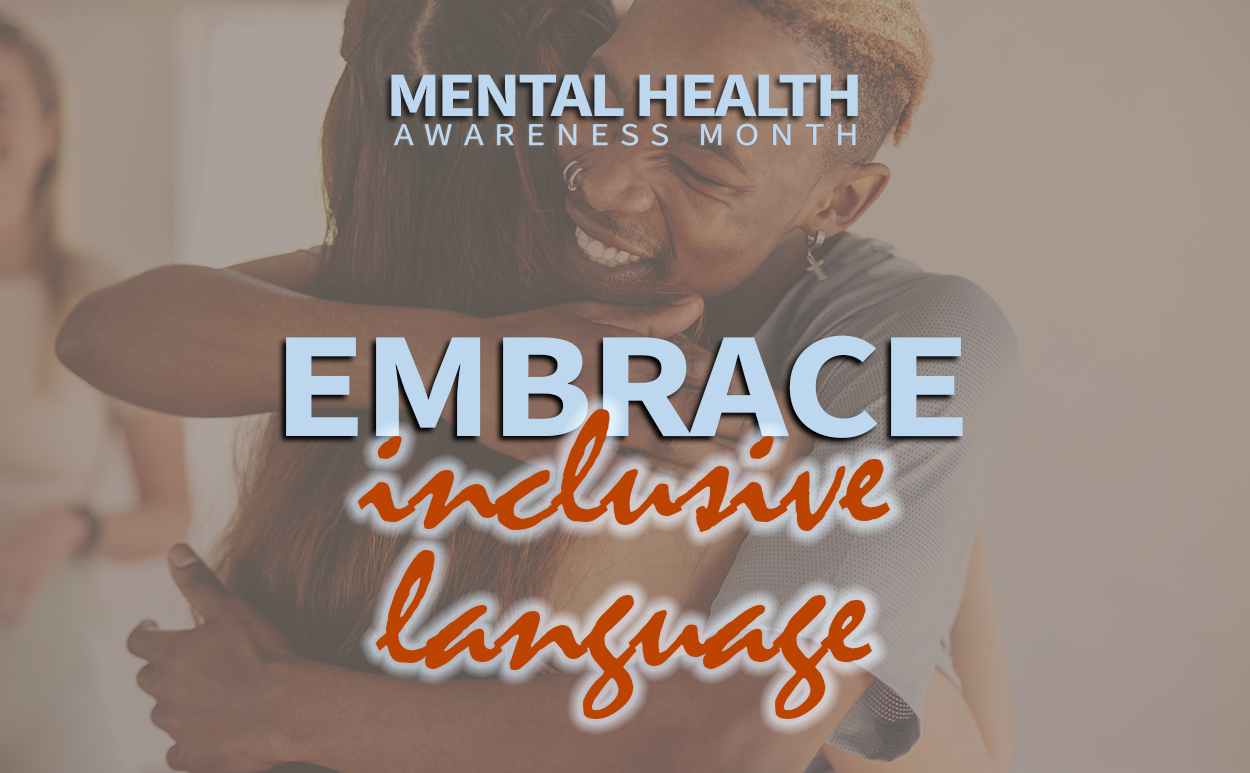TALKING ABOUT MENTAL HEALTH. IT CAN BE HARD, BUT WHEN WE USE OPEN AND COMPASSIONATE LANGUAGE, WE EMPOWER OURSELVES AND OTHERS TO FIND THE HELP THEY NEED.
Be mindful and use inclusive language when talking about mental health
Mental health is a vital part of our well-being, but it is often neglected or stigmatized in our society. Many people struggle with mental health issues, such as anxiety, depression, bipolar disorder, post-traumatic stress disorder, or substance use disorder, but they may not feel comfortable or safe to seek help or share their experiences. This can lead to isolation, shame, and worse outcomes for their health and happiness.
As a community, we each play a part in one another’s mental wellness. The language we use to talk about mental health can either perpetuate prejudice and discrimination or promote acceptance and compassion. When it comes to mental health, words matter. It is up to each of us to be a lifeline. When we use open and compassionate language around mental health issues, we empower ourselves and encourage others to find the help they need.
This week in our Mental Health Awareness Month series, we look at some of the ways we can use inclusive language and to talk more openly about mental health challenges. We will also consider the perspectives of marginalized groups, the impact of discrimination on mental health, and the particular challenges many people face in getting help.

What is inclusive language?
Inclusive language is language that respects and acknowledges the diversity of human experiences and identities. It avoids terms or expressions that exclude, stereotype, or harm people based on their race, ethnicity, gender, sexuality, disability, age, religion, or any other aspect of who they are.
Using inclusive language means taking intentional steps towards reducing the stigma of mental health. For those who struggle with anxiety, depression, or other mental health challenges, hearing inclusive language helps them feel they aren’t “broken” — rather, that they’re people going through a difficult time.
Examples of inclusive language for mental health:
- Using person-first language: This means putting the person before their diagnosis or condition. For example, instead of saying “a schizophrenic” or “an addict”, say “a person with schizophrenia” or “a person with substance use disorder”. This way, you acknowledge that they are more than their diagnosis and that they have dignity and agency.
- Using recovery-oriented language: This means using words that convey hope and optimism for people’s ability to recover and live fulfilling lives. For example, instead of saying “suffering from” or “afflicted with”, say “living with” or “experiencing”. This way, you avoid implying that they are helpless victims or that their condition is permanent.
- Using respectful and accurate terms: This means avoiding words that are outdated, offensive, or inaccurate when referring to mental health issues. For example, instead of saying “crazy”, “insane”, “psycho”, or “mental”, say “mental health issue”, “mental illness”, or “psychiatric disorder”. This way, you avoid using labels that are hurtful and dehumanizing.

Talking openly about mental health challenges
Talking openly about mental health challenges can be beneficial for both ourselves and others. It can help us express our feelings, cope with stress, and seek support. It can also help others feel less alone, more understood, and more encouraged to find the help they need.
However, talking openly about mental health can be hard. We may face stigma, discrimination, or misunderstanding from others. We may also feel vulnerable, ashamed, or afraid of being judged. That’s why it’s important to choose a safe and supportive space to have these conversations.
Tips for listening and opening up about mental health challenges
- Start by asking permission. Before you share your own experience or ask someone else about theirs, make sure they are comfortable and willing to talk. You can say something like “I wanted to talk to you about something that’s been on my mind. Is this a good time?” or “I noticed you’ve been feeling down lately. Do you want to talk about it?”
- Be respectful and empathetic. Listen actively and attentively to what the other person is saying. Don’t interrupt, judge, or offer unsolicited advice. Try to understand their perspective and validate their feelings. You can say something like “I hear you” or “That sounds really hard”.
- Be mindful of the cultural context. Mental health challenges can be experienced differently in different cultures. Be respectful of people’s cultural beliefs and practices.
- Be aware of the impact of discrimination. Discrimination can have a significant impact on mental health. Be sensitive to the experiences of people who have faced discrimination.
- Ask open-ended questions. Avoid yes-or-no questions that may shut down the conversation. Instead, use questions that invite the other person to share more details or feelings. You can say something like “How are you coping with that?” or “What do you think would help you feel better?”
- Share your own experience (if appropriate). If you have a similar or relevant experience with mental health challenges, you can share it with the other person if you think it would be helpful. This can show them that they are not alone and that there is hope for recovery. However, be careful not to make the conversation about yourself or compare your situation to theirs.
- Offer support and resources. Let the other person know that you care about them and that you are there for them. Ask them what kind of support they need or want from you. You can also suggest some resources that might be helpful for them, such as a therapist, a support group, or a helpline. However, don’t pressure them to do anything they are not ready for or comfortable with.
Five tips for people who never know what to say
Here are some examples of how you can use warm and caring language when talking to someone about mental health challenges:
- “I’m here for you if you need to talk.”
- “I know that you’re going through a tough time right now. I’m here to support you.”
- “It’s okay to not be okay. There’s help available.”
- “You’re not alone. There are people who care about you and want to help.”
- “I’m proud of you for reaching out for help. That’s a big step.”
Resources to learn more and get people talking about mental health and inclusive language
Take your mental health to the next level with Aunt Martha’s




